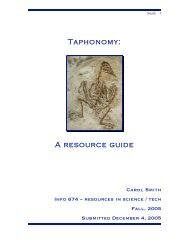Digitization of Special Collections - Carol Smith Home Page
Digitization of Special Collections - Carol Smith Home Page
Digitization of Special Collections - Carol Smith Home Page
- No tags were found...
You also want an ePaper? Increase the reach of your titles
YUMPU automatically turns print PDFs into web optimized ePapers that Google loves.
<strong>Smith</strong> 18For some, that future is bleak. Burrows (2000) concludes that “as far as electronicmaterials are concerned, the importance <strong>of</strong> a local collection is in rapid decline” (p. 144).Supporting anecdotes abound. Cullen (2001) cites a conversation with a dean thatquestioned the value <strong>of</strong> maintaining expensive special collections with only limited value tohis local academic constituency (p. 88), while Phillips (2002) mentions a colleague voicingconcern that the value <strong>of</strong> special collections is diminished by the rise <strong>of</strong> digital libraries (p.56).In contrast to this sobering outlook, most authors express continued confidence inthe future <strong>of</strong> special collections. Phillips (2002) observes that in-house use <strong>of</strong> Louisiana StateUniversity’s special collections has not lessened with the expanded availability <strong>of</strong> digitalsurrogates (p. 57), and Sutton (2004) believes that special collections will become even morehighly valued as the “defining characteristic <strong>of</strong> a university library’s identity” (p. 235).Graham (1998) concurs, stating, “<strong>Special</strong> collections will continue in importance because <strong>of</strong>the continuing importance <strong>of</strong> artifactual documents” (p. 1). Albanese goes perhaps thefurthest, quoting a colleague who asserts that “In the future, I believe great research librarieswill be evaluated more and more on their special collections” (p. 18).All acknowledge, however, that the role <strong>of</strong> special collections is changing in thedigital age, and that special collections librarians need to play an active part in shaping thatrole. Michel (2005), for example, asserts that the pr<strong>of</strong>ession must “re-evaluate and re-accessour purpose and role as special libraries and librarians” (p. 383). Hirtle (2001) identifies threeparticular areas where special collections librarians should focus: 1) they should emphasizethose holdings that are truly unique, primarily manuscripts and archival documents, 2) theyshould embrace and promote the idea <strong>of</strong> special collections as museums, and place increasedemphasis on the artifactual value <strong>of</strong> holdings, and 3) they should look for new collections





